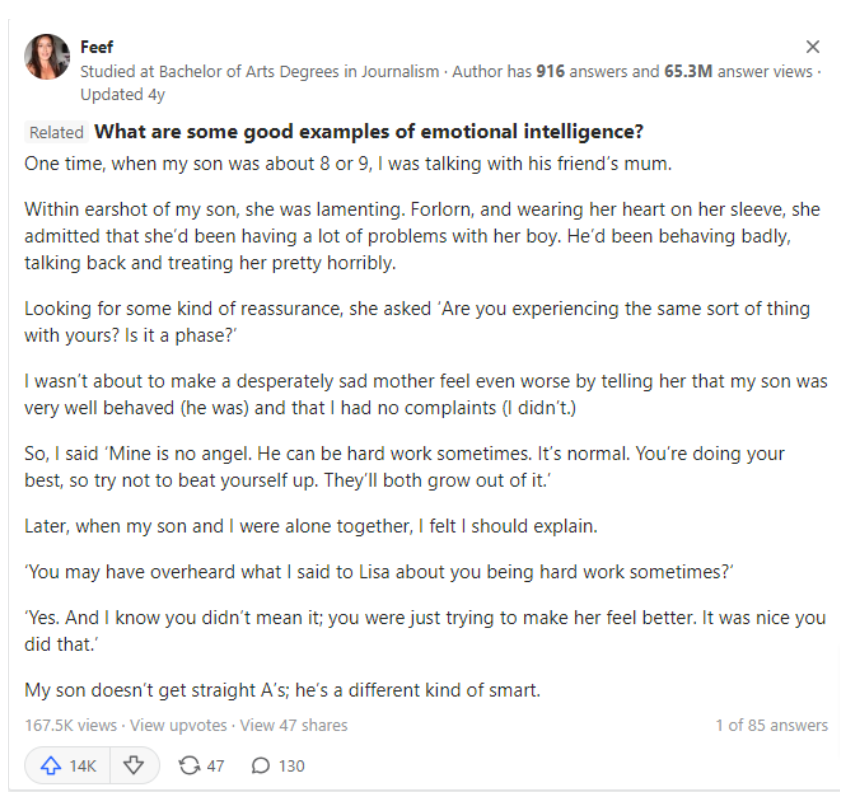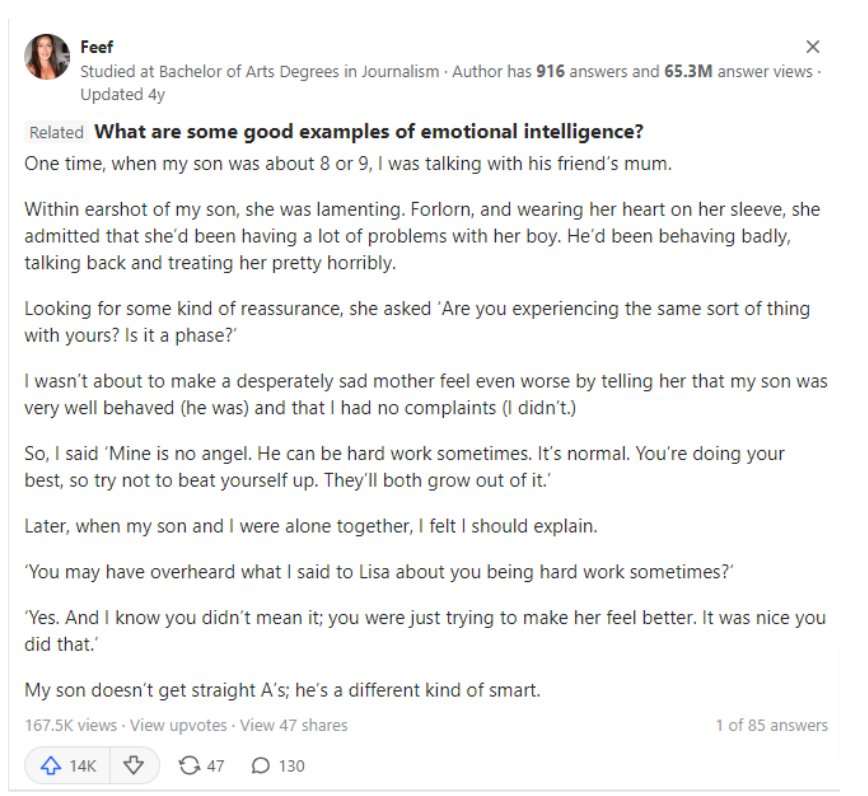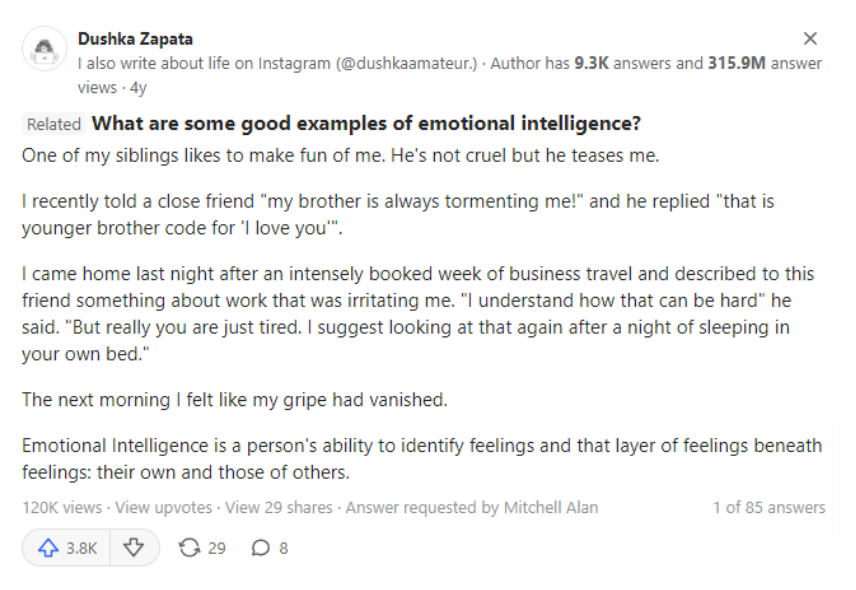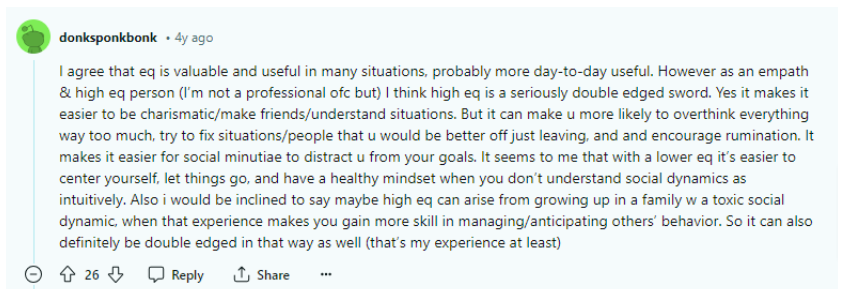IQ vs EI represents two different ways of understanding intelligence and human behavior.
While IQ typically measures cognitive abilities like logic, problem-solving, and learning, EI focuses on our capacity to recognize, manage, and influence emotions for both our own and others.
Though traditionally, IQ has been seen as the main indicator of intelligence, EI has gained increasing recognition for its role in personal success, career achievement, and well-being. In this article, I will help you explore the distinctions between IQ and EI, their impacts on various aspects of life, and why emotional intelligence might matter more than intellectual prowess in certain situations.
Key Takeaway: Is EI More Important Than IQ?
- A high EI helps build relationships, reduce team stress, defuse conflict, and improve job satisfaction.
- While being book-smart might help you pass tests, emotional intelligence prepares you for the real world by being aware of the feelings of others and your feelings.
- Developing a versatile skill set and knowing when to switch between EI and IQ can improve your communication skills and help you become resilient to various demanding challenges.

Understanding IQ And EI
You exercise your intellectual and emotional muscles throughout the day. This is a comparison between the two.
IQ (Intelligence Quotient)
Your IQ usually refers to your intelligence. The common elements of your IQ include your ability to:
- Use logic to solve problems
- Grasp and use language
- Learn and adapt to change
- Understand abstract ideas
- Plan and strategize.
Well, there are limitations to IQ in assessing a person’s overall intelligence. The concept entirely focuses on cognitive abilities and can not measure non-cognitive skills like empathy, teamwork, mindset, and social awareness.
EI (Emotional Intelligence)
Do you know what feelings you are experiencing?
Is it possible for you to manage those emotions without letting them take over you?
Are you able to identify and successfully respond to others’ emotions?
You have most likely mastered some or all of the abilities that make up emotional intelligence if you can say “yes” to each of these questions.
In 1995, Daniel Goleman identified five different skill categories that together comprise the essential traits of emotional intelligence (EI) in his book “Emotional Intelligence: Why It Can Matter More Than IQ.” He suggested that they are skills that can be learned and developed, unlike IQ.
These five key areas are self-awareness, self-regulation, empathy, relationship management, and social skills.
Therefore, EI is a dynamic element that may be enhanced, in contrast to relatively stable IQ.
Why Does EI Matter More Than IQ?
Being highly emotionally intelligent makes you more self-aware, which makes it easier for you to control your emotions. This affects a person’s success and well-being more than scholastic intellect.
Success In Career
In an interview on LinkedIn, Virgin Group founder Richard Branson stated,
“I think being emotionally intelligent is more important in every aspect of life – including business. Being a good listener, finding empathy, understanding emotions, communicating effectively, treating people well, and bringing out the best is critical to success. It will also help you build a business that really understands people and solves their problems, and it will make for a happier and healthier team, too.“
Several studies have shown that when co-workers participate in an EI training program
their teamwork, conflict management abilities, job performance, and general job satisfaction.
Healthy Relationships
Having high emotional intelligence may lead to greater satisfaction in relationships.
A study of 159 couples found that frame of mind generally was the most significant factor in satisfaction in marriages. The study also concluded that EI was the main factor leading to marital satisfaction for 40.8% of the couples.
Schutte et al. (2001) found a significant link between high EI and satisfying relations in a series of studies. Those participants who exhibited higher levels of emotional intelligence also showed a greater propensity for empathic perspective-taking, cooperation with others, and developing affectionate relationships.
Mental Health And Well-being
Difficulty identifying and managing emotions can be because of some mental health conditions, such as depression and borderline personality disorder.
A study on 505 adolescents between the ages of 12 and 18 revealed that low emotional intelligence might play a part in social anxiety.
Persistent social anxiety can sometimes lead you to avoid social situations and contribute to hopelessness or depression.
Research also links alcohol dependency and other substance usage to lower EI. This means addiction can cause changes in the brain that affect your ability to manage and interpret emotions and impulses.
EI vs IQ In Various Fields
While IQ measures a number of skills, including intuition, worldly knowledge, logical and analytical thinking, and memory, emotional intelligence (EI) is measured by traits like diligence, empathy, self-confidence, teamwork, self-control, integrity, adaptability, patience, and the capacity to listen.
Education
In academic success, EI is as important as mathematical intelligence. Researchers in a study conducted on 60 students have shown that our success depends on EI 80% and only 20% of intellect.
Associate Professor Carolyn MacCann of the University of Sydney conducted a study in 2020 consisting of 42,000 students from 27 countries. The study found that students with higher emotional intelligence generally had better grades, regardless of age and other personality factors.
The author noted:
“Although we know that high intelligence and conscientious personality are the most important psychological traits necessary for academic success, our research highlights a third factor, emotional intelligence, that may also help students succeed.”
Another analysis study in 2021 found that gifted people had higher emotional intelligence.
As EI is trainable, it has also been considered an important skill to develop in school environments, and there is now a growing demand for teachers to implement behaviors informed by EI principles in the classroom.
Another research postulates that assessing the emotional elements in any situation, whether positive or negative, will help the students engage and enable the teachers to understand their behavior and current mindset better.
Work, Business, And Entrepreneurship
The workplace is where both emotional and logical interactions occur between you and others.
High-IQ people overvalue the importance of IQ and undervalue EI.
However, a study links emotional intelligence to job success and satisfaction in the workplace.
Those with a higher EI are more likely to manage stress better. A research review published in 2019 found that EI can help people recover more quickly from acute anxiety. This may make individuals more successful at work.
It is essential to mention that EI does not only apply at the management level. A study states that employees lower down the business hierarchy with good emotional intelligence skills have the ability to establish and maintain high-quality relationships in the workplace.
Research on Steve Jobs revealed that he was a highly motivating, driven, and emotionally intelligent individual who used his strengths to his advantage.
Healthcare
Emotional intelligence is an important skill set in the healthcare environment.
A study shows that it takes both – IQ and EI- to ensure an excellent, caring doctor who can lead healthcare teams and help engage patients. But medicine has typically overemphasized IQ and ignored, or at least underemphasized, emotional intelligence.
The authors noted:
“In medicine, IQ is necessary to master and critically assess the volume and complexity of information integral to contemporary medical education. But past this threshold, success in medicine is ultimately more about emotional intelligence.”
Research indicates that the level of emotional intelligence development influences personal accomplishment in healthcare professionals like doctors, nurses, and therapists. The same study also supports the importance of training focused on developing EI in specialists from the healthcare system.
The study shows that EI enables nurses to grasp the idea of healthcare as a complex system. It also plays a vital role in the nurses being able to have self-motivation and self-confidence.
Practical Tips For Developing Emotional Intelligence
Everyone can engage in practices that develop the emotional aspects of our intelligence, even though some people are more naturally gifted than others at using their EQ. Following are the methods that can help you boost your EI.
Self-Assessment
The very first step in enhancing your EI is self-assessment. Several different assessments have cropped up to measure levels of emotional intelligence. They mainly fall into two types: self-report tests and ability tests.
Self-report tests are widespread because they are easy to administer and score. On such tests, respondents answer the question by rating their own behaviors.
On the other hand, ability tests involve having people respond to situations and assessing their skills. Such tests require people to demonstrate their abilities, which a third party rates.
Self-Awareness And Self-Regulation Techniques
Self-awareness is the ability to notice your emotions and recognize them.
Meditation and mindfulness can help develop our self-awareness and improve our reactions. A workplace study conducted in 2018 found that meditation increased EI in participants while helping to decrease their perceived stress.
Talking about your feelings with family and health professionals (such as psychiatrists, psychologists, counselors, etc. can help you develop greater self-awareness and understanding. A professional can help you become aware of emotional areas you could strengthen.
Emotional journaling is a self-regulation and self-awareness technique. This technique is very simple and should be practiced regularly (every 10 minutes) until it is internalized. The key is to identify every emotion and jot it down in your journal.
Training and Development
Mindfulness is important in understanding yourself, your thoughts and feelings, and what is important to you. It can help you develop self-awareness.
A study published in 2021 revealed a direct relationship between emotional intelligence and mindfulness, particularly the capacity to regulate emotions. Furthermore, mindfulness is inversely related to emotional exhaustion.
The authors noted:
“Training interventions based on mindfulness have proved useful in promoting emotional balance, emotional awareness, emotional acceptance, emotional recognition, expressive suppression and reduction in emotional exhaustion.”
Building Social Awareness and Relationship Management Skills
Feeling that no one is listening to you or understanding what you have to say can be frustrating. Most have been in this situation.
As you actively listen to them and pay attention to what they have to say, you may help these folks feel heard and understood. To avoid misconceptions, clarify things with inquiries. Show them that you have considered the significance of what they have stated by summarizing or considering it.
You may improve your relationships in your daily life by developing the crucial skill of conflict resolution. Though not all conflict resolution strategies are effective in all circumstances, there are many that can be used.
In general, there are five categories into which conflict resolution can be categorized: cooperation, compromise, withdrawal, accommodation, and competitiveness.
Personal Anecdotes And Testimonials
I have been researching people’s real-life experiences and illustrating how developing EI has positively impacted their lives.
A user from Quora shared the following incident.

Another user shared how people with high emotional intelligence positively impact their surroundings.

Reddit Community Insights
Reddit offers different perspectives gathered from discussions on forums related to the topic.
I found many valuable insights from Reddit. Here are a few of them.
A Reddit user shared how EI is better than IQ.

Another user shed some light on the troubles people with high EI face.

More In IQ:
Conclusion: IQ Focuses On Cognition, EI Encompasses Understanding
In a world that increasingly values interpersonal skills, emotional intelligence is proving to be just as vital, if not more so, than traditional IQ.
Whether in professional settings, personal relationships, or mental health, EI shapes how we navigate challenges, communicate effectively, and form meaningful connections.
While IQ remains important, developing emotional intelligence can enhance overall success, happiness, and well-being.
The good news is, unlike IQ, EI can be nurtured and improved with practice. By embracing self-awareness, mindfulness, and empathy, we can all work towards becoming more emotionally intelligent individuals.